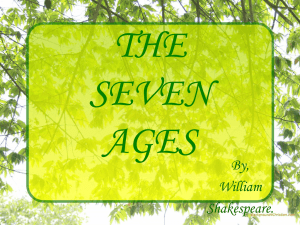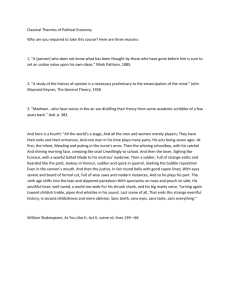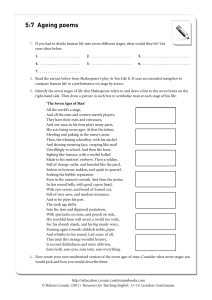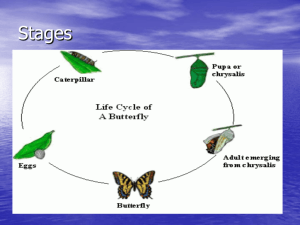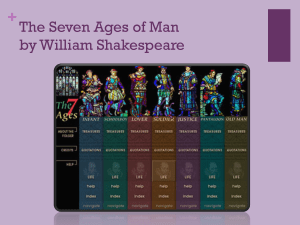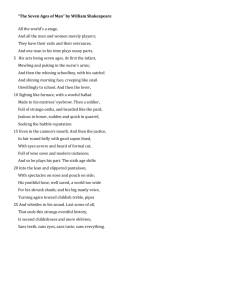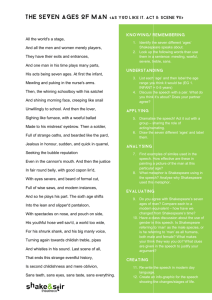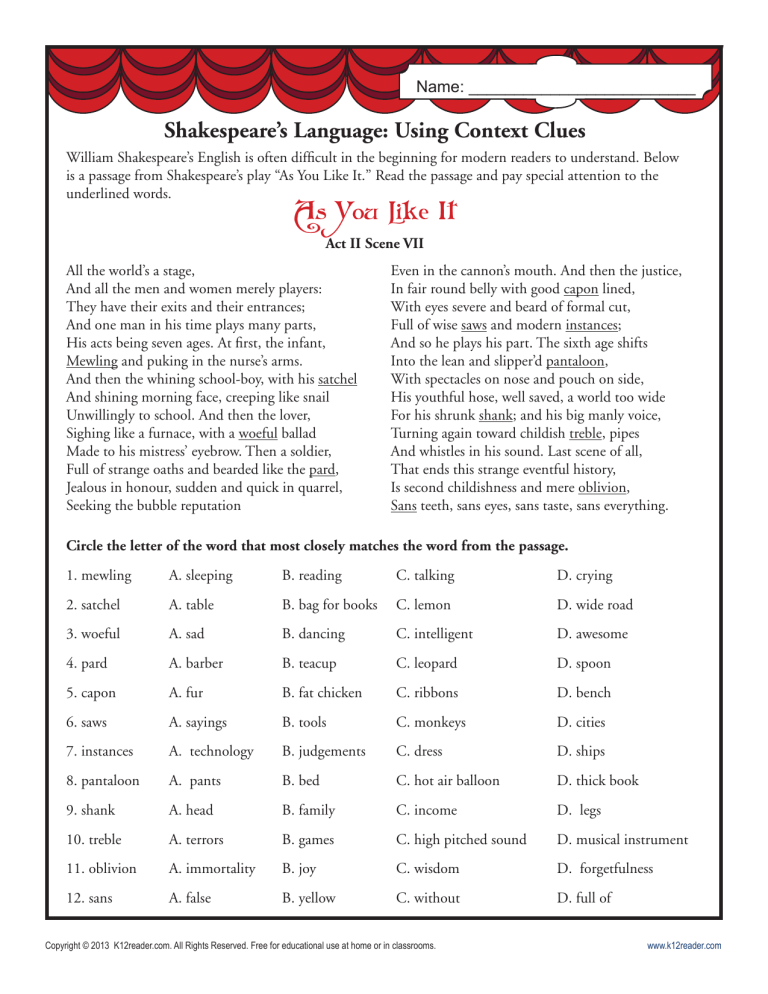
Name: _________________________ Shakespeare’s Language: Using Context Clues William Shakespeare’s English is often difficult in the beginning for modern readers to understand. Below is a passage from Shakespeare’s play “As You Like It.” Read the passage and pay special attention to the underlined words. As You Like It Act II Scene VII All the world’s a stage, And all the men and women merely players: They have their exits and their entrances; And one man in his time plays many parts, His acts being seven ages. At first, the infant, Mewling and puking in the nurse’s arms. And then the whining school-boy, with his satchel And shining morning face, creeping like snail Unwillingly to school. And then the lover, Sighing like a furnace, with a woeful ballad Made to his mistress’ eyebrow. Then a soldier, Full of strange oaths and bearded like the pard, Jealous in honour, sudden and quick in quarrel, Seeking the bubble reputation Even in the cannon’s mouth. And then the justice, In fair round belly with good capon lined, With eyes severe and beard of formal cut, Full of wise saws and modern instances; And so he plays his part. The sixth age shifts Into the lean and slipper’d pantaloon, With spectacles on nose and pouch on side, His youthful hose, well saved, a world too wide For his shrunk shank; and his big manly voice, Turning again toward childish treble, pipes And whistles in his sound. Last scene of all, That ends this strange eventful history, Is second childishness and mere oblivion, Sans teeth, sans eyes, sans taste, sans everything. Circle the letter of the word that most closely matches the word from the passage. 1. mewling A. sleeping B. reading C. talking D. crying 2. satchel A. table B. bag for books C. lemon D. wide road 3. woeful A. sad B. dancing C. intelligent D. awesome 4. pard A. barber B. teacup C. leopard D. spoon 5. capon A. fur B. fat chicken C. ribbons D. bench 6. saws A. sayings B. tools C. monkeys D. cities 7. instances A. technology B. judgements C. dress D. ships 8. pantaloon A. pants B. bed C. hot air balloon D. thick book 9. shank A. head B. family C. income D. legs 10. treble A. terrors B. games C. high pitched sound D. musical instrument 11. oblivion A. immortality B. joy C. wisdom D. forgetfulness 12. sans A. false B. yellow C. without D. full of Copyright © 2013 K12reader.com. All Rights Reserved. Free for educational use at home or in classrooms. www.k12reader.com Key Name: _________________________ Shakespeare’s Language: Using Context Clues William Shakespeare’s English is often difficult in the beginning for modern readers to understand. Below is a passage from Shakespeare’s play “As You Like It.” Read the passage and pay special attention to the underlined words. As You Like It Act II Scene VII All the world’s a stage, And all the men and women merely players: They have their exits and their entrances; And one man in his time plays many parts, His acts being seven ages. At first, the infant, Mewling and puking in the nurse’s arms. And then the whining school-boy, with his satchel And shining morning face, creeping like snail Unwillingly to school. And then the lover, Sighing like a furnace, with a woeful ballad Made to his mistress’ eyebrow. Then a soldier, Full of strange oaths and bearded like the pard, Jealous in honour, sudden and quick in quarrel, Seeking the bubble reputation Even in the cannon’s mouth. And then the justice, In fair round belly with good capon lined, With eyes severe and beard of formal cut, Full of wise saws and modern instances; And so he plays his part. The sixth age shifts Into the lean and slipper’d pantaloon, With spectacles on nose and pouch on side, His youthful hose, well saved, a world too wide For his shrunk shank; and his big manly voice, Turning again toward childish treble, pipes And whistles in his sound. Last scene of all, That ends this strange eventful history, Is second childishness and mere oblivion, Sans teeth, sans eyes, sans taste, sans everything. Circle the letter of the word that most closely matches the word from the passage. 1. mewling A. sleeping B. reading C. talking D. crying 2. satchel A. table B. bag for books C. lemon D. wide road 3. woeful A. sad B. dancing C. intelligent D. awesome 4. pard A. barber B. teacup C. leopard D. spoon 5. capon A. fur B. fat chicken C. ribbons D. bench 6. saws A. sayings B. tools C. monkeys D. cities 7. instances A. technology B. judgements C. dress D. ships 8. pantaloon A. pants B. bed C. hot air balloon D. thick book 9. shank A. head B. family C. income D. legs 10. treble A. terrors B. games C. high pitched sound D. musical instrument 11. oblivion A. immortality B. joy C. wisdom D. forgetfulness 12. sans A. false B. yellow C. without D. full of Copyright © 2013 K12reader.com. All Rights Reserved. Free for educational use at home or in classrooms. www.k12reader.com
